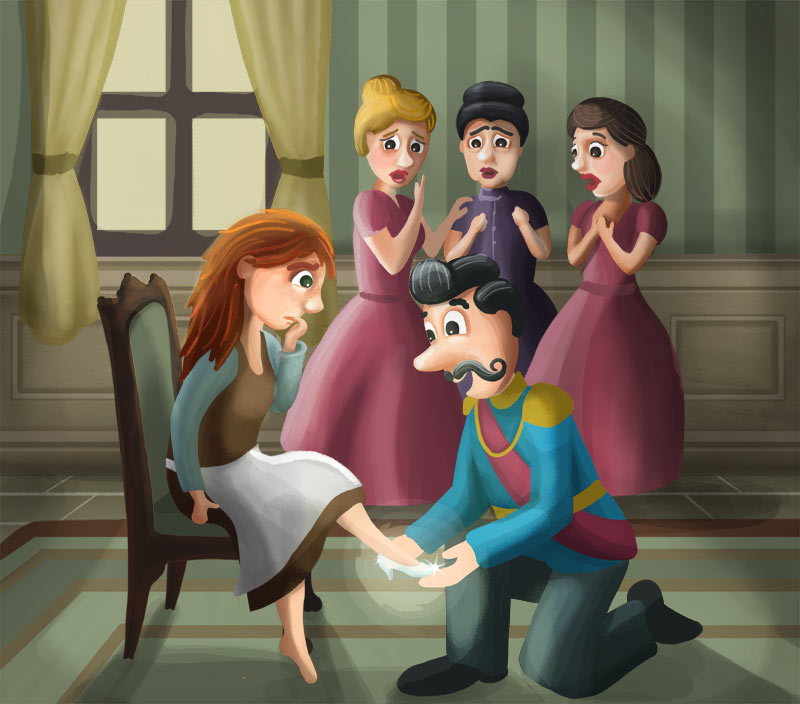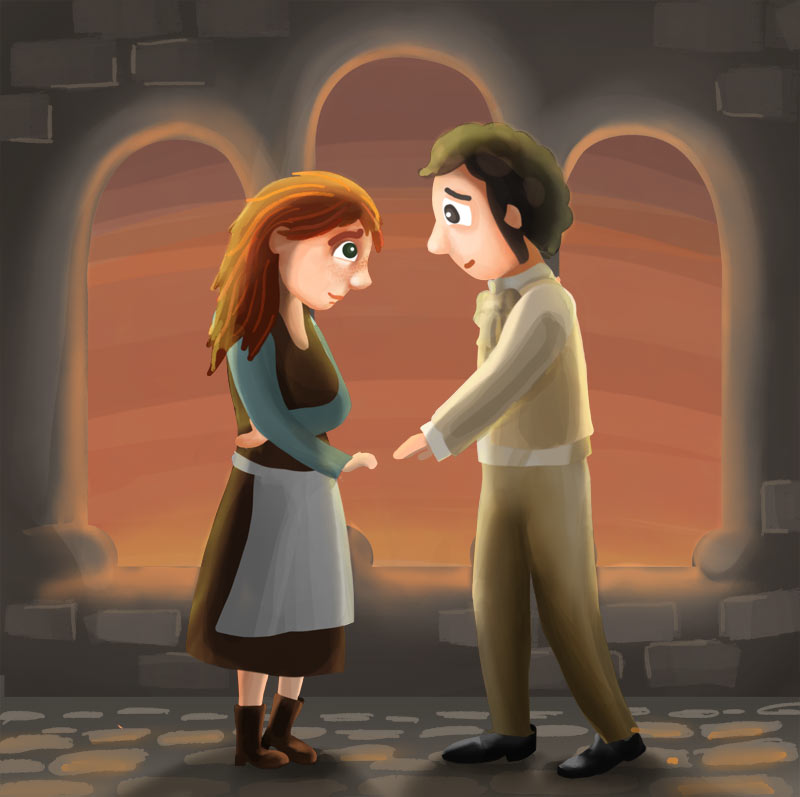How Fly saved the river
There was once a river so beautiful that all the animals came to drink from it. One day a giant moose came to this river.
“He’s so big!” cried out a beaver named Barney.
“Even bigger than Big Bear,” added Betty, another beaver.
“He sure is thirsty,” noticed Marty, a muskrat/ մշկառնետ/.
“He’s drinking so much that the river is going down!” yelled Mary, another muskrat.
The animals grew worried.
“Our beaver dams will be destroyed,” warned Barney.
“And we’ll have no water to drink,” said Mary.
Big Bear, who had been listening to the whole time said, “Let’s meet tonight and plan how to get rid of this pest.“
“Count me in!” added Fly.
All the animals laughed at Fly. How was such a tiny creature going to help?
As the sky grew dark, Fly joined the others on the riverbank.
“So, what’s the plan?” he asked.
Barney started by saying, “I will gnaw on that moose’s legs until he runs away.“
“But he’ll kick you with his big strong hooves!”, warned Betty.
“Oh,” said Barney. “I didn’t think of that.”
“We need another plan,” both muskrats said at the same time.
“I am the strongest,” said Big Bear. “I’ll fight that moose.”
“But the moose is twice your size!” said Fly.
The beavers and muskrats all said to Fly, “Be quiet. You are the weakest of all.”
The next morning, Bear was worried. Was Fly right? Was the moose truly twice his size?
“Bear hurry!” said the muskrats.
But Big Bear did not move.
“I’m… I’m… scared,” he replied.
“Maybe we should try my plan,” Fly admitted. But all the other animals just laughed at Fly.
So, Fly flew onto the moose’s back. Holding on tightly, he bit the moose as hard as he could.
“Ouch!” cried the moose.
Fly flew up and bit the moose’s ear.
“Stop it!” the moose yelled.
“I’ll never stop,” said Fly, as he flew around and bit the moose on its leg.
The moose was unable to stop Fly, so he turned and ran. The animals never saw him again.
That night, the beavers made fish stew. The muskrats danced a special dance in honour of Fly.
“Hooray for Fly!” they all sang.
“You see,” began Fly, “even the weakest animal can beat the strongest if he uses his brain.”
- Տեքստի ընդգծված նախադասությունները դարձրու հարցական և ժխտական:
- Դուրս գրիր անանոթ բառերը։
- Сried out – Բղավեց
- Beaver –
- Hooves – սմբակներ
- Yelled – Բղավեց
- Rid – Ազատվել
- Pest – Վնասատու
- Gnaw – Կրծոտել
- Moose – Մոզ
- Weakest – Ամենաթույլ
- Tightly – Սերտորեն
- Stew – Շոգեխաշել
- Տեքստից դուրս գրիր ածականները` beautiful, big, thirsty, worried, tiny, dark, strong, quiet
- Տեքստից դուրս գրիր մակբայերը՝ beautifuly, tightly, weakest, bigger, strongest․
- Ին՞չ կենդանիներ կան տեքստում, դուրս գրիր, ին՞չ հետաքրքիր փաստեր գիտես կենդանիների մասին, համացանցից դուրս հանիր և պատրաստիր նյութ հետևյալ վերնագրերով՝ <<Do you know?>> կամ <<It is intersting to know>>
Do you know?
- Bears have the largest relative brain size of any carnivore!
- Wild brown bears use rocks as a tool to scratch an itchy spot.
- Black bear cubs do as their mothers do! A study has shown that bears reared in the wild forage independently whereas bears reared by mothers who typically forage on food made available by humans adopt their mother’s foraging style.
- Bears can develop strong attachments to other bears. Following the death of his sister, an 18-year-old captive male brown bear only slept for a third of the time he did before, and spent more time inactive, compared with when his sister was alive. It is likely that the two had developed a close bond, and the loss was greatly felt.
- Brown bears in Scandinavia know they are being hunted. Solitary bears subject to hunting change their usual activity pattern to increase their safety and outsmart the hunters!
- Play behaviour is key to surviving in the wild. The more that brown bear cubs play, the more likely they are to survive to adult independence. Researchers found that this was unaffected by other factors such as food, maternal characteristics, and health, suggesting that lots of play is essential for growing bears to reach independence.
- Why didn’t the other animals think Fly’s plan would work?
a) Bear was too scared.
b) Fly was too small.
c) The moose was too fast.
d) Fly had a broken wing.
2) What problem was the moose causing?
a) He was destroying the animals’ homes.
b) He was being mean to the animals.
c) He was drinking too much water.
d) He was eating all their food.
3) Which line from the story shows that Fly is determined (strong-minded)?
a) “I’ll never stop.”
b) “Hooray for Fly!”
c) “But the moose is twice your size!”
d) “So, what’s the plan?”
4) Fly is the smallest animal in the story. In what way is he the strongest? Explain
your answer.
5) What was the moose doing that made the animals call him a pest?
6. How Fly Saved the River
- Տեղադրիր a, an, some, any
- Please get some bread from the baker’s.
a)any
b) a
c) an
d) some
2. We need some money to buy a present for mother’s Birthday.
a) any
b) a
c) an
d) some
Dad, there are some letters for you.
a) any
b) a
c) an
d) some
4. There aren’t any books on the shelf.
a) any
b) a
c) an
d) some
5. It is an elephant.
a) any
b) a
c) an
d) some
6. Thanks a lot. Can I have some water first?
a) any
b) a
c) an
d) some
7. It is a very interesting story about animals.
a) any
b) a
c) an
d) some
- Կարդա հետևյալ տեղեկությունները կենդանիների մասին և ընտրիր, թե յուրաքանչյուր հատվածը որ կենդանու մասին է՝ cat, dog, hamster, lizard, fish, parrot
- It is a good friend. Takes it out for walks every day. Feed it meat and give it water to drink.
It is a dog.
2. It needs an aquarium to swim. Change the water and clean the quarium regulary. Feed your pet special food once a day.
It is a fish.
. It needs a warm house. It needs rocks and plants to climb on. Feed it insects, spiders, mice or rats and give it water to drink.
It is a cat.
4. It is very friendly and likes to play outside. It sleeps a lot and needs a quiet and warm place to rest. Feed it special biscuits, meat or fish and water to drink.
It is a lizard.
5. It needs a cage where it can run around and a box to sleep in. Feed your pet seeds, nuts, fruit and vegetables and give water to drink.
It is a hamster.
6. It needs a big cage. Don’t forget to clean the cage. Pet your pet fly outside the cage regularly. Feed your pet seeds and give water to drink
.It is a parrot.
Adjective /Ածականներ/& Adverb Մակբայեր/
Ածականները գործածում ենք գոյականների և դերանունների հետ․ Ածականները գրում ենք գոյականներից կամ դերանուններից առաջ։
- I have a black cat.
- He dropped the hot plate.
Մակբայները գործածում ենք բայերի հետ, նկարագրում ենք բայերին՝
- She sang loudly.
- He speaks slowly.
Մակբայը կազմվում է ածականին ավելացնելով –ly- մասնիկը՝
Bad-badly, sad-sadly
Մակբայների համեմատական և գերադրական աստիճանները կազմում ենք օգտագործելով more և most
- She sang more loudly than her friend.
- She sang most loudly in the class.
Օրինակներ՝
- Careful զգույշ (ածական): He is always careful.
- Carefully (մակբայ): She put the glasses down carefully.
- Quiet հանգիստ(ածական): This is a quiet room.
- Quietly (մակբայ): She spoke quietly.
- Bad վատ (ածական): This coffee is bad!
- Badly (մակբայ): He sings badly!
Եթե ածականը վերջանում է ‘y’, ապա ‘y’ դառնում է ‘i’ and այնուհետ ավելացնում ենք ‘ly’. Եթե ածականը վերջանում է ‘le’, ‘e’ սզվում է, և ավելանում է ‘y’.
- Happy ուրախ (ածական): She looks very happy.
- Happily մակբայ): He sang happily.
- Gentle նուրբ (ածական): It’s a gentle cat.
- Gently (մակբայ): He stroked the cat gently.
Կան բացառություններ՝
- Fast արագ (ածական): That’s a fast car.
- Fast (մակբայ): She walks fast.
- Early շուտ (adjective- ածական): She was early for the meeting.
- Early (adverb-մակբայ): He arrived early.
- Late ուշ (adjective): He is always late!
- Late (adverb): He got up late this morning (‘lately’ is also an adverb but means ‘recently’).
- Good լավ (adjective): That is a good book.
- Well (adverb): She did well on the exam (‘well’ can also be an adjective; see below).
- Hard դժվար (adjective): Maths is hard!
- Hard (adverb): She tried hard (‘hardly’ is also an adverb, but means ‘almost none’; see below).
Կարդա և համեմատիր՝
She is a slow reader. She reads slowly.
He is a quick runner. He runs quickly.
She is a bad cook. She cooks badly.
He is a good footballer. He plays football well.
Լրացրեք some or any վարժ: 1, վարժ: 2
Լրացրեք ածական/ adjective/ կամ մակբայ/ adverb/` վարժ: 1, վարժ: 2


